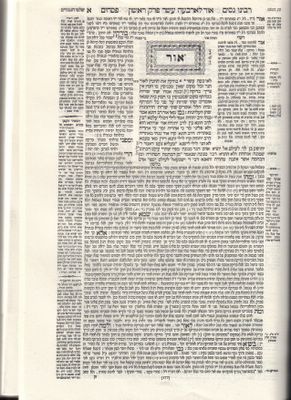
HIDE/SHOW IMAGE
1a
{Pesachim 2a}
Mishna:
The evening {Or} of the fourteenth {of Nissan} they search for the chametz by the light of a candle.
Any place in which chametz is not brought does not require a search.
And why did they say the two rows in a cellar? A place to which they bring chametz.
Bet Shammai says: Two rows over the entire cellar;
and Bet Hillel say:The two outer rows, that are the uppermost.
Gemara:
What is meant by Or {in the Mishna}?
Rav Huna said: Naghei {lit. "light"}
And Rav Yehuda said: Leilei {=night}
{At this point, the assumption is that there is an actual dispute, and Rav Huna maintains the Mishna means daybreak of the fourteenth, while Rav Yehuda holds the break of night of the fourteenth. In the end we conclude otherwise:}
{Pesachim 3a}
All agree - both Rav Huna and Rav Yehuda - that Or means night, and they do not in fact argue. He {explains the terms} in accordance with his location and he in accordance with his location. In Rav Huna's place, they call Or Naghei. In Rav Yehuda's place, they call it Leilei.
And why did our Tanna not call it Leilei {and thus avoid the confusion}? He chose a refined expression. For Rabbi Yehoshua ben Levi said: One should never let an unrefined expression leave his mouth, for Scripture diverted 8 letters in order not to use an unrefined expression. For it is stated {Bereishit 7:2}:
It's been a while...
-
I've been blogging a bit on Substack, at Scribal Error. While focused more
on gemara and girsaot, I just had a post on Rationalism and Midrash. Check
ou...
3 years ago



No comments:
Post a Comment